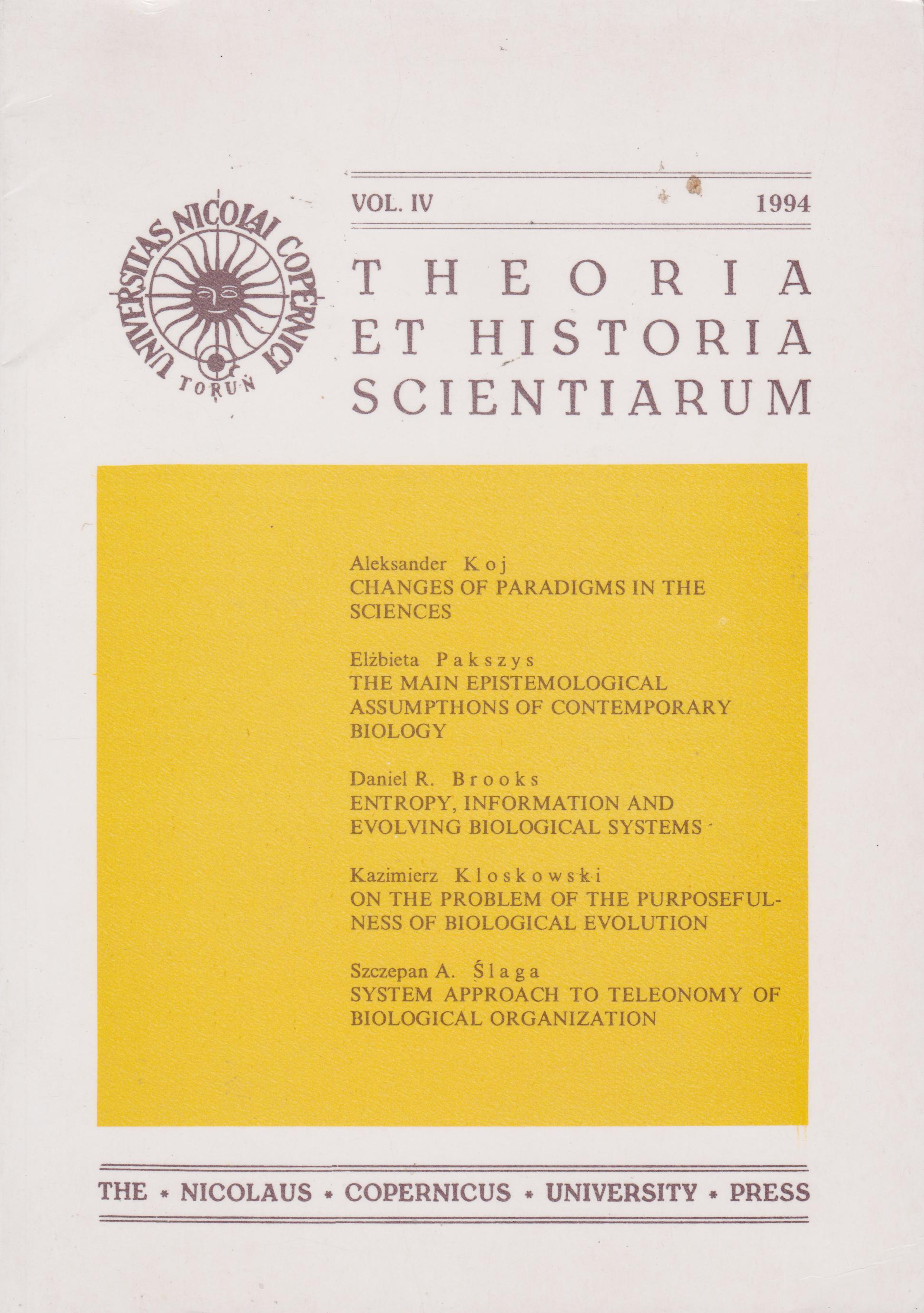Etropy, Information and Evolving Biological Systems
DOI:
https://doi.org/10.12775/ths.1994.004Keywords
biological systems, entropy, natural selectionAbstract
Internal production rules in biological systems require outside energy but are also highly insensitive to the conditions of the external environment from which the energy comes. This leads to the production of historically constrained, spontaneously stable, complex structure. Because the production rules are physically encoded in the structure of the system, biological systems are physical information systems, and their expected behavior over time follows a general entropie dynamic. The autonomy of the production rules leads to an explanation for the reality of natural selection that does not rely on analogy with human economic theory. The historical nature of the elements of diversity at any given time leads to an expectation that the details of responses to external evolutionary forces, such as natural selection, competition, or geological changes, will be highly individualized. Hence, evolutionary regularities will tend to be highly generalized (macroevolutionary) or statistical in nature.
References
Brillouin, L. 1962. Science and Information Theory. New York: Academic Press.
Brooks, D. R., J. Collier, B. A. Maurer, J. D. H. Smith, and E.O. Wiley. 1989. Entropy and information in evolving biological systems. Biol. Philos. 4: 407-432.
Brooks, D. R., D.D. Cumming and P. H. LeBlond. 1988. Dollo's Law and the second Law of Thermodynamics: Analogy or extension? In Information Entropy and Evolution: New Perspectives on Physical and Biological Evolution, ed. B.H. Weber, D. J. Depew and J.D. Smith, pp. 189-224. Cambridge, Mass.: MIT Press
Brooks, D.R., P.H. LeBlond and D.D. Cumming. 1984. Information and entropy in a simple evolution model. J. Theor. Biol. 109: 77-93.
Brooks, D. R. and E.O. Wiley. 1988. Evolution as Entropy: Toward a Unified Theory of Biology. Chicago: Univ. Chicago Press. 2nd ed. 415 pp.
Collier, J. 1987. Entropy in evolution. Biol. Philos. 1: 5-24.
Frautschi. S.1982. Entropy in an expanding universe. Science 217: 593-599.
Frautschi, S. 1988. Entropy in an expanding universe. In Information Entropy and Evolution: New Perspectives on Physical and Biological Evolution. ed. B.H. Weber, D.J. Depew and J.D. Smith, pp. 11-22. Cambridge, Mass.: MIT Press.
Gatlin, L. 1972. Information Theory and the Living System New York: Columbia Univ. Press. Landsberg, P.T. 1984 a. Is equilibrium always an entropy maximum1 J. Slat. Physics 35: 159-169.
Landsberg, P. T. 1984 b. Can entropy and „order” increase together? Physics Letters 102 A: 171-173. Layzer, D. 1975. The arrow of time. Sci. Amer. 233: 56-69.
Layzer, D. 1978. A macroscopic approach to population genetics. Z Thenr. Biol. 73: 769-788. Layzer, D. 1980. Genetic variation and progressive evolution. Amer. Nat. 115: 809-826.
Lotka, A. J. 1913. Evolution from the standpoint of physics, the principle of the persistence of stable forms. Sci. Amer. Suppl. 75: 345-6, 354, 379.
Lotka, A. J. 1925. Elements of Physical Biology. Baltimore: Williams and Wilkins.
Prigogine, I. 1980. From Being to Becoming. San Francisco: W.H. Freeman.
Prigogine, 1. and J.M. Wiame. 1946. Biologie et thermodynamique des phenomenes irreversibles. Experientia 2: 451-453.
Salthe, S. N. 1985. Evolving Hierarchical Systems: Their Structure and Representation. New York: Columbia Univ. Press.
Smith, J.D. H. 1988. A class of mathematical models for evolution and Hierarchical Information Theory. Inst. Math. Appl. Preprint Series 396: 1-13.
Ulanowicz, R. E. 1980. An hypothesis on the development of natural communities. J. Theor. Biol. 85: 223-245.
Zotin, A. 1. and R.S. Zotina. 1978. Experimental basis for qualitative phenomenological theory of development. In Thermodynamics of Biological Processes, ed. I. Lamprecht and A. I. Zotin, pp. 61-84. Berlin: DeGruyter.
Downloads
Published
How to Cite
Issue
Section
Stats
Number of views and downloads: 359
Number of citations: 0



